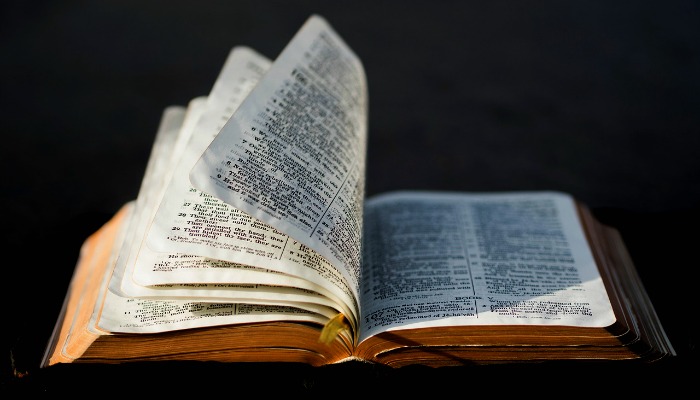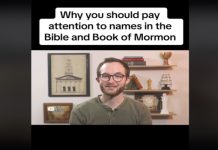
The Holy Bible is a big deal. It is unequivocally the word of God, but the fact is that it’s teachings are subject to interpretation. Some people take things very literally, for some it’s the opposite. This is one of the reasons why there are so many different Christian sects today—that’s what differing interpretations of scripture do.
This article outlines four major doctrines the Bible is just unclear on. First, I’ll point out what the confusion is all about. Afterwards (at the end of the article) I’ll explain why I’m totally OK with each case.
1. The nature of the “Trinity”
Is there just one God, or is there three? Is God the Father different than Jesus Christ and the Holy Ghost, or are all of them three iterations of the same being? Do they share one essence in three forms? Or are they simply three separate beings altogether?
The Bible is debatably unclear on this issue. Early Christian leaders met together on multiple occasions to hash out Christianity’s official stance, but the result of these councils only emphasizes the utter confusion surrounding the topic. Instead of quoting them in their entirety, for the sake of space, here’s what Elder Jeffrey R. Holland said about these creeds back in 2007:
These various evolutions and iterations of creeds—and others to come over the centuries—declared the Father, Son, and Holy Ghost to be abstract, absolute, transcendent, immanent, consubstantial, coeternal, and unknowable, without body, parts, or passions and dwelling outside space and time. In such creeds all three members are separate persons, but they are a single being, the oft-noted “mystery of the trinity.” They are three distinct persons, yet not three Gods but one. All three persons are incomprehensible, yet it is one God who is incomprehensible.
Yeah. It’s confusing, but understandably so. I mean, what do you do when Christ prays to the Father but then says, “Believe me that I am in the Father, and the Father in me.” And then we get some New Testament story about a guy named Stephen: “But he, being full of the Holy Ghost, looked up steadfastly into heaven, and saw the glory of God, and Jesus standing on the right hand of God ….” Are they one being, or separate?
We’ll resolve this later.
2. The correct form of baptism
The Bible makes it abundantly clear that baptism is a commandment. What is widely debated in the Christian world, though, is exactly how to perform a baptism and what makes that baptism valid. Essentially all the Bible tells us is that Christ sought out John the Baptist to perform his baptism,
And Jesus, when he was baptized, went up straightway out of the water: and, lo, the heavens were opened unto him, and he saw the Spirit of God descending like a dove, and lighting upon him:
And lo a voice from heaven, saying, This is my beloved Son, in whom I am well pleased.
(Notice the Godhead clues in these verses as well.) Some Christian sects take Christ’s example as evidence that a valid baptism requires full submersion in the water. Other sects, like Catholicism, are fine without full submersion.
But what about authority to baptize? Can anyone do it? Did Christ have to go to John? The bible doesn’t explicitly answer that one either. Yet, there is an answer.
3. Where do we go right after we die?
Most sects assume that after we die we either go to Heaven or Hell, but bear with me for a second. While Christ was suffering on the cross, he spoke to the thief next to him,
And Jesus said unto him, Verily I say unto thee, To day shalt thou be with me in paradise.
Well, great, that’s Heaven, right? They’re going back to be with God the Father. But wait, three days later the resurrected Christ says to Mary Magdalene,
Touch me not; for I am not yet ascended to my Father: but go to my brethren, and say unto them, I ascend unto my Father, and your Father; and to my God, and your God.
OK so apparently the day of Christ’s death He went somewhere called Paradise, but this paradise was obviously not where God the Father was. So where do we go immediately after we die if it’s not Heaven or Hell? That’s about all the Bible tells us.
But don’t worry, there’s an answer.
4. Is there more scripture than the Holy Bible?
The Bible seems to be quite clear on this one. Revelation chapter 22 clearly states:
If any man shall add unto these things, God shall add unto him the plagues that are written in this book:
And if any man shall take away from the words of the book of this prophecy, God shall take away his part out of the book of life . . .
This appears to be the most conclusive Biblical evidence against extra-Biblical scripture, but further study reveals some complications with these verses, which we’ll get to in a moment.
Why I’m OK with all the contradiction and confusion
As members of The Church of Jesus Christ of Latter-day Saints, thankfully we have The Book of Mormon. This volume of scripture (similar to the Bible) provides additional details that corroborate and clarify the teachings of the Bible.
Here’s how The Book of Mormon helps us understand these four essential doctrines, starting in reverse order:
Response: Is there more scripture than the Holy Bible?
Revelation 22 clearly condemns The Book of Mormon, right? Well, upon further study we discover that the books of the Bible itself are not ordered chronologically. This article from Huffington Post explains,
Revelation is not last, but almost in the middle, written in the 90s. Twelve documents follow Revelation, with II Peter the last, written as late as near the middle of the second century.
We can thus conclude that these verses from Revelation exclusively apply to the book that is Revelation, not to the whole Bible. Otherwise, a huge chunk of the New Testament should be considered heresy.
Additionally, The Book of Mormon teaches us,
Know ye not that there are more nations than one? Know ye not that I, the Lord your God, have created all men, and that I remember those who are upon the isles of the sea; and that I rule in the heavens above and in the earth beneath; and I bring forth my word unto the children of men, yea, even upon all the nations of the earth?
Wherefore murmur ye, because that ye shall receive more of my word? Know ye not that the testimony of two nations is a witness unto you that I am God, that I remember one nation like unto another? Wherefore, I speak the same words unto one nation like unto another. And when the two nations shall run together the testimony of the two nations shall run together also.
And I do this that I may prove unto many that I am the same yesterday, today, and forever; and that I speak forth my words according to mine own pleasure. And because that I have spoken one word ye need not suppose that I cannot speak another; for my work is not yet finished; neither shall it be until the end of man, neither from that time henceforth and forever.
Wherefore, because that ye have a Bible ye need not suppose that it contains all my words; neither need ye suppose that I have not caused more to be written.
Response: Where do we go right after we die?
The Book of Mormon adds some wonderful commentary on where Christ went for the three days before his resurrection:
. . . the spirits of those who are righteous are received into a state of happiness, which is called paradise, a state of rest, a state of peace, where they shall rest from all their troubles and from all care, and sorrow.
. . . the spirits of the wicked, yea, who are evil—for behold, they have no part nor portion of the Spirit of the Lord; for behold, they chose evil works rather than good . . . these shall be cast out into outer darkness . . .
. . . thus they remain in this state, as well as the righteous in paradise, until the time of their resurrection.
After we die, like Christ, our spirits inhabit this “spirit world.” It’s like a waiting room for spirits before the resurrection and final judgment come (though spirits there are hardly sitting around twiddling their spirit thumbs).
Response: The correct form of baptism
The culminating event of The Book of Mormon is a post-resurrection visitation of Jesus Christ. During his visit, Christ details the correct manner of baptism:
And it came to pass that he spake unto Nephi (for Nephi was among the multitude) and he commanded him that he should come forth.
. . . And the Lord said unto him: I give unto you power that ye shall baptize this people when I am again ascended into heaven.
And again the Lord called others, and said unto them likewise; and he gave unto them power to baptize. And he said unto them: On this wise shall ye baptize; and there shall be no disputations among you.
. . . Behold, ye shall go down and stand in the water, and in my name shall ye baptize them.
And now behold, these are the words which ye shall say, calling them by name, saying:
Having authority given me of Jesus Christ, I baptize you in the name of the Father, and of the Son, and of the Holy Ghost. Amen.
And then shall ye immerse them in the water, and come forth again out of the water.
And after this manner shall ye baptize in my name . . .
Response: The nature of the “Trinity”
During Christ’s visit, He also explains in more detail the relationship He has (and that we should have) with God the Father.
Father, thou hast given them the Holy Ghost because they believe in me; and thou seest that they believe in me because thou hearest them, and they pray unto me; and they pray unto me because I am with them.
And now Father, I pray unto thee for them, and also for all those who shall believe on their words, that they may believe in me, that I may be in them as thou, Father, art in me, that we may be one.
. . . Father, I pray not for the world, but for those whom thou hast given me out of the world, because of their faith, that they may be purified in me, that I may be in them as thou, Father, art in me, that we may be one, that I may be glorified in them.
The Book of Mormon helps us to understand that God the Father, His son Jesus Christ and the Holy Ghost are indeed three different beings, but united in one purpose.
The Holy Bible is essential
The Bible is fantastic. The individuals who authored it were inspired and they undoubtedly did the best they could. Those of us left to interpret its teachings are also doing the very best we can, even though we often disagree. I’m grateful we can disagree without being disagreeable.
If you haven’t yet, I invite you to explore The Book of Mormon to personally discover how it can help us interpret the Bible. You can read it online at LDS.org or have a free copy delivered to your door.





